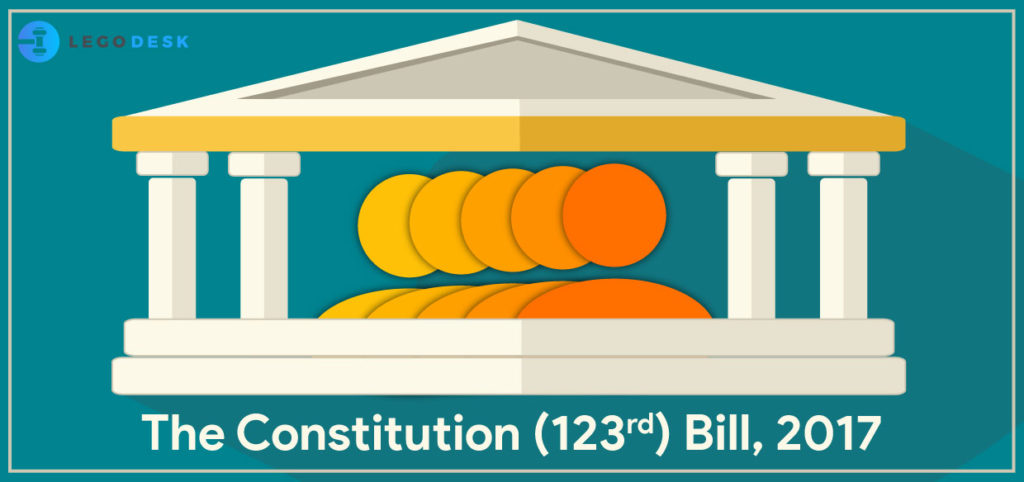The Constitution (One Hundred and Twenty-Third Amendment) Bill, 2017

123 Constitutional amendment bill
123 Constitutional Amendment Bill, 2017 was introduced in Lok Sabha by the Minister of Social Justice and Empowerment, Mr. Thaawarchand Gehlot on April 5, 2017. The Bill was passed by the Lok Sabha on April 10, 2017, and was referred to a Select Committee on April 11, 2017.
Read Also – The Constitution – One Hundred and Twenty Fourth Amendment Bill, 2019
Summary of the Bill
What the Bill seeks to do is to establish the National Commission for Backward Classes under the Constitution. A new Article 338B will be inserted in the Constitution after the Amendment. It will read as follows, ‘There shall be a commission for the socially and educationally backward classes to be known as the National Commission for Backward Classes.’ The current NCBC was created under an Act of Parliament in 1993 which will now be repealed, and a new NCBC will be created under Article 338B alongside Article 338 and 338A will create a National Commission for SCs and STs respectively.
At present, the National Commission for Scheduled Castes also has the power to look into complaints regarding backward classes and also promote their welfare by employing certain measures. Through the Amendment, this power of the NCSC will be taken away and given to the newly constituted NCBC.
The NCBC, on the other hand, will be given the power to examine complaints regarding inclusion or exclusion of groups within the list of backward classes, and further, give the Central Government advice on how to improve their situation and make their lives better. It will comprise of five members appointed by the Parliament. Their tenure and conditions of service will be left to the prerogative of the President who will decide the same through Rules.
Functions of the Commission – The functions of the NCBC will include: (i) investigating and monitoring how safeguards provided to the backward classes under the Constitution and other laws are being implemented, (ii) inquiring into specific complaints regarding violation of rights, and (iii) advising and making recommendations on socio-economic development of such classes.
Governments at both the Central and State Level will be required to consult the Commission if they are formulating any policies relating to backward classes and similarly, the Commission will be required to present yearly reports to the President on the situation of the backward classes.
Lastly, the Commission has been bestowed with the powers of a civil court under the Bill. These powers include: (i) summoning people and examining them on oath, (ii) requiring the production of any document or public record, and (iii) receiving evidence.
Read Also – Fundamental Rights and Constitutional Rights of Indian Citizens
Recommendations of the Select Committee
The Select Committee accepted the Bill in its present form without recommending any major changes. One recommendation, although, was in the composition of the Commission. The Committee had said that the Commission should comprise seven members instead of five. These seven members should include a woman member and a member from the backward community mandatorily. This would ensure adequate representation on the table. But, this recommendation was not adopted.
Read Also – All About Corporate Governance in India
Criticism of the Bill
It has been stated time and again that the Amendment is unusual because it brings the Backward Classes in league with the SCs/STs as victims of discrimination, exclusion, and violence. Critics feel that that makes the Amendment illogical. Therefore, it also lacks historical justification and makes one question the entirety of India’s social welfare system.
Another criticism stems from the fact that Article 340 will become dead after this Amendment. Article 340 deals with the need to identify the socially and educationally backward classes, and make recommendations for their improvement. The Bill does not repeal this Article and constitutes another Commission consisting of similar provisions.
One is right to assume that the Backward Classes deserve state support as they also face discrimination of some kind. But there is no justification for supposing that their condition is as bad as those of SCs or STs. In that light, provisions that bring them in tandem with the SCs and STs unintentionally reduce the intensity of discrimination that caste and tribal groups have faced since times immemorial.
Read Also – Top 9 New Changes in the Laws of India in 2017-19
Conclusion
The logic of the 123rd Amendment to the Indian Constitution is far from misplaced. It is extremely unusual and seems like it will degenerate into perversion sooner rather than later. By fragmenting these ‘weaker’ sections such as SCs, STs, BCs, and other minorities into different groups with different redressal mechanisms undermines the entire fabric on which the social justice system of India is based. But, the solution to the same is not that one is supposed to smuggle a certain group identity into another group identity and intend to merge the two. When the two identities are starkly different with varying historical, social, and economic backgrounds, it is impossible to fuse them together. Doing so, which the 123rd Amendment is clearly doing, will only give birth to a monster which is sure to do more mischief than good.
Try our Debt Resolution solutions today Request a Demo